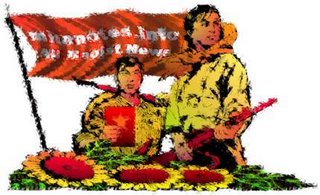
Judging from Maoist supremo Prachanda’s scathing response to the serious allegations leveled by central committee members Rabindra Shrestha and Anukul (Mani Thapa), rifts in rebel ranks seem to be real.
Issuing a hard-hitting statement, Prachanda expelled the duo from the party, saying they had turned into “traitors and counterrevolutionaries and joined the autocratic monarchy.” No trace of any eagerness to “re-educate” the two men.
Now the dissidents and the leadership both accuse each other of being royalists, an accusation that has driven much of the acrimony in Nepal’s fractious communist movement.
Echoing much of Prachanda’s rancor, Maoist chief ideologue Dr. Baburam Bhattarai accused Shrestha of having indulged in suspicious anti-party behavior while in custody. (Shrestha, considered the chief Maoist organizer in Kathmandu valley, was arrested in November 2001 and released two years later, after the second abortive peace process began.)
Recounting his own serious rifts with Prachanda last year, Dr. Bhattarai disclosed how Rabindra and Anukul stood on opposite sides fanning the flames of discord.
Maoist military commander Pasang joined in the criticism by endorsing Prachanda’s and Dr. Bhattarai’s multicount indictments of the duo. Pasang’s involvement seemed aimed more at quelling rumors that Shrestha and Anukul enjoyed the backing of an influential section of the “People’s Liberation Army.”
The questions raised by the Maoist leadership are not without merit. Could it be mere coincidence that Shrestha and Anukul came out with their appeal a day after Home Minister Kamal Thapa announced amnesty to all Maoists who surrendered and also to offer big rewards if they also brought weapons with them?
Moreover, why did the duo provoke such a nasty exchange in public at a time when the mainstream opposition parties and Maoists were busy trying to reinforce their anti-palace campaign? They were, after all, asked to present their grievances through “proper channels”.
All the same, the leadership’s vitriolic response cannot obscure the fact that neither Prachanda nor Dr. Bhattarai considered it fit to rebut the substance of the dissidents’ charges.
Apart from identifying instances of ideological deviation, the duo accused Prachanda of protecting his son from frontline duty. They slammed Dr. Bhattarai for providing his daughter with “bourgeoise” education instead of enlisting her in the army.
Shrestha and Anukul excoriated the two leaders for staying abroad for much of the decade-long “people’s war.”
These questions have vexed Nepalis of all political persuasions for quite some time. When Prachanda and Dr. Bhattarai buried their differences with remarkable alacrity last year, they didn’t win points for their gift for reconciliation. Most Nepalis are still clueless about the terms under which they patched up to forge an anti-palace alliance with the mainstream opposition parties.
What next?
In an interview with the BBC Nepali Service, Shrestha said he would continue to fight against the leadership from within the party. “If our appeals are not heard, we may be forced to look for an alternative,” he added.
Prachanda’s expulsion order makes the first option untenable. Less clear is whether his shoot-the-messenger approach will work.
Whether Shrestha and Anukul can form a splinter group capable of carrying out their self-proclaimed cultural revolution would depend on how much support they have within the party.
It may be unwise, though, to count them out just yet. Their litany of grievances – and the leadership’s refusal to address them -- has given others an ideological cover for insurrection. And for the truly war-weary, the government’s amnesty-with-cash offer isn’t all that bad.